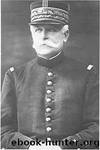General Maurice Sarrail, 1856-1929 by Jan Karl Tanenbaum

Author:Jan Karl Tanenbaum [Tanenbaum, Jan Karl]
Language: eng
Format: epub
Tags: History, Europe, France
ISBN: 9780807897935
Google: C43IYgEACAAJ
Publisher: University of North Carolina Press
Published: 2011-01-27T22:27:25+00:00
IX.Swing to the Right: Recall
I am completely indifferent about the Paix-[Séailles]-Mathieu Affair.â¦We must find something else for my enemies.
âSARRAIL to Jean Decrais, September 9, 1917
In September, 1917, Radical-Socialist Alfred Margaine informed Sarrail of two important points. First, the British had demanded that Sarrail be recalled.1 Margaine was correct, for on June 6, immediately following the May offensive, Lloyd George wrote to Premier Ribot that the British, Serbian, Russian, and Italian commanders at Salonika complained that in one way or another Sarrailâs recent offensive had been poorly planned and coordinated; consequently, Sarrail should be recalled.2
Although much of the criticism leveled against Sarrailâs management of the spring offensive was valid, it may have been that the attacks served as a convenient smoke screen for shortcomings to be found elsewhere. Certainly the Serbs who refused to leave their trenches had not distinguished themselves during the 1917 spring offensive. Nor had General Milne, although he was quick to suggest that the offensive had failed because Sarrail, in response to Parisâs frequent warnings that military operations against Greece were imminent, had kept two French divisions in reserve where they remained inactive during the entire offensive.3 It appears that the British commander had been plagued by the same self-doubts and brooding pessimism that had characterized his performance during the 1916 offensive. His uninspired and lackluster leadership during the May offensive led naval Captain Alfred Stead to observe: â[Milne] shelters himself behind the orders he receives from Sarrail with whom he has not even tried to cooperate. Before commencing the offensive he said that the task allotted to him was impossibleâresult thousands of casualties. He regards the whole expedition as a fiasco and his only desire is to clear out of the country.â4
On June 7 the Ribot government discussed Lloyd Georgeâs request; once again, Poincaré recorded, it was âthe eternal Sarrail question.â Not surprisingly, it was Painlevé who defended Sarrail from Londonâs criticism. The war minister emphasized that an army composed of several nationalities always posed exceptional difficulties for its commander and Sarrailâs Eastern Army was no exception. Ribot, on the other hand, was sympathetic to Englandâs recommendations.5 Nevertheless, the premier had to reject Lloyd Georgeâs request because, as Painlevé cautioned London, if Sarrail were recalled, âit would bring down the Ribot government with a crashâand the Alliance with it.â6 London did not forget Painlevéâs warning. Two months later when the War Cabinet again seriously considered requesting that Sarrail be removed, it refrained from presenting its demand to Paris, fearing that the Ribot government could not recall Sarrail without becoming involved in a serious political crisisâone that could possibly result in the fall of the French government.7 Robertson was correct when he complained that as long as Painlevé held a Cabinet position, Sarrail would not be ignominiously sacked.8
Second, Margaine informed Sarrail that the generalâs political supporters were disappointed that with Painlevéâs advent to power as war minister and then as premier in September, Sarrail had not been given a prominent position on the Western front, possibly as commander of a combined Franco-American army.
Download
This site does not store any files on its server. We only index and link to content provided by other sites. Please contact the content providers to delete copyright contents if any and email us, we'll remove relevant links or contents immediately.
| France | Germany |
| Great Britain | Greece |
| Italy | Rome |
| Russia | Spain & Portugal |
Fanny Burney by Claire Harman(26583)
Empire of the Sikhs by Patwant Singh(23062)
Out of India by Michael Foss(16837)
Leonardo da Vinci by Walter Isaacson(13292)
Small Great Things by Jodi Picoult(7102)
The Six Wives Of Henry VIII (WOMEN IN HISTORY) by Fraser Antonia(5488)
The Wind in My Hair by Masih Alinejad(5070)
A Higher Loyalty: Truth, Lies, and Leadership by James Comey(4939)
The Crown by Robert Lacey(4791)
The Lonely City by Olivia Laing(4787)
Millionaire: The Philanderer, Gambler, and Duelist Who Invented Modern Finance by Janet Gleeson(4448)
The Iron Duke by The Iron Duke(4337)
Papillon (English) by Henri Charrière(4238)
Sticky Fingers by Joe Hagan(4174)
Joan of Arc by Mary Gordon(4081)
Alive: The Story of the Andes Survivors by Piers Paul Read(4010)
Stalin by Stephen Kotkin(3940)
Aleister Crowley: The Biography by Tobias Churton(3622)
Ants Among Elephants by Sujatha Gidla(3450)
